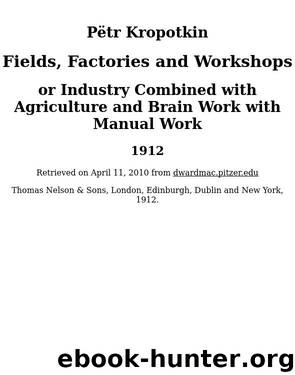Fields, Factories and Workshops by Pëtr Kropotkin & Pëtr Kropotkin

Author:Pëtr Kropotkin & Pëtr Kropotkin
Language: eng
Format: epub
Tags: agriculture, industry
Published: 1912-03-05T16:00:00+00:00
Petty Trades in France
Small industries are met with in France in a very great variety, and they represent a most important feature of national economy. it is estimated, in fact, that while one-half of the population of France live upon agriculture, and one-third upon industry, this third part is equally distributed between the great industry and the small one.[138] This last occupies about 1,650,000 workers and supports from 4,000,000 to 5,000,000 persons. A considerable number of peasants who resort to small industries without abandoning agriculture would have to be added to the just-mentioned items, and the additional earnings which these peasants find in industry are so important that in several parts of France peasant proprietorship could not be maintained without the aid derived from the rural industries.
The small peasants know what they have to expect the day they become factory hands in a town; and so long as they have not been dispossessed by the money-lender of their lands and houses, and so long as the village rights in the communal grazing grounds or woods have not been lost, they cling to a combination of industry with agriculture. Having, in most cases, no horses to plough the land, they resort to an arrangement which is widely spread, if not universal, among small French landholders, even in purely rural districts (I saw it even in HauteSavoie). One of the peasants who keeps a plough and a team of horses tills all the, fields in turn. At the same time, owing to a wide maintenance of the communal spirit, which I have described elsewhere,[139] further support is found in the communal shepherd, the communal wine-press, and various forms of “aids” amongst the peasants. And wherever the village-community spirit is maintained, the small industries persist, while no effort is spared to bring the small plots under higher culture.
Market-gardening and fruit culture often go hand in hand with small industries. And wherever well-being is found on a relatively unproductive soil, it is nearly always due to a combination of the two sister arts.
The most wonderful adaptations of the small industries to new requirements, and substantial technical progress in the methods of production, can be noted at the same time. It may even be said of France, as it has been said of Russia, that when a rural industry dies out, the cause of its decay is found much less in the competition of rival factories — in hundreds of localities the small industry undergoes a complete modification, or it changes its character in such cases — than in the decay of the population as agriculturists. Continually we see that only when the small landholders have been ruined, as such, by a group of causes — the loss of communal meadows, or abnormally high rents, or the havoc made in some locality by the marchands de biens (swindlers enticing the peasants to buy land on credit), or the bankruptcy of some shareholders’ company whose shares had been eagerly taken by the peasants [140] — only then do they abandon both the land and the rural industry and emigrate towards the towns.
Download
This site does not store any files on its server. We only index and link to content provided by other sites. Please contact the content providers to delete copyright contents if any and email us, we'll remove relevant links or contents immediately.
| Anarchism | Communism & Socialism |
| Conservatism & Liberalism | Democracy |
| Fascism | Libertarianism |
| Nationalism | Radicalism |
| Utopian |
The Secret History by Donna Tartt(19047)
The Social Justice Warrior Handbook by Lisa De Pasquale(12187)
Thirteen Reasons Why by Jay Asher(8892)
This Is How You Lose Her by Junot Diaz(6877)
Weapons of Math Destruction by Cathy O'Neil(6264)
Zero to One by Peter Thiel(5786)
Beartown by Fredrik Backman(5737)
The Myth of the Strong Leader by Archie Brown(5496)
The Fire Next Time by James Baldwin(5431)
How Democracies Die by Steven Levitsky & Daniel Ziblatt(5213)
Promise Me, Dad by Joe Biden(5141)
Stone's Rules by Roger Stone(5081)
A Higher Loyalty: Truth, Lies, and Leadership by James Comey(4950)
100 Deadly Skills by Clint Emerson(4919)
Rise and Kill First by Ronen Bergman(4778)
Secrecy World by Jake Bernstein(4740)
The David Icke Guide to the Global Conspiracy (and how to end it) by David Icke(4699)
The Farm by Tom Rob Smith(4502)
The Doomsday Machine by Daniel Ellsberg(4484)
